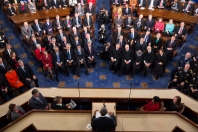Letter to undecided senators on the Iran deal
Robert Satloff/Washington Institute/September 01/15
Congratulations, senators. You have fended off both advocates and critics of the Iran nuclear agreement and are among the few remaining “undecideds.” You have built up leverage. How will you use it? Since you are undecided, you don’t consider the deal either brilliant or imbecilic. Rather, you recognize its achievements but also shake your heads at its flaws.
You’ve heard the argument that scuttling the deal may ultimately leave America more isolated than Iran, but you also know from your years on foreign relations, intelligence and armed services committees that the agreement carries huge risks for U.S. and allied interests. Deep down, you would like to improve the deal by closing loopholes and strengthening deterrence that has been eroded by the administration’s eagerness to get across the finish line. You have been impressed by suggestions on how to achieve this goal unilaterally by the U.S. government or jointly with our European allies, i.e., without even opening the agreement for renegotiation. These include:
*Repairing a hole in the agreement by reaching detailed understandings with European allies on penalties for Iranian violations short of the last-resort “snapback” of UN sanctions. Since President Obama has said he opposes publicizing these details, you would suffice with having him provide a full accounting to the chairmen of the relevant congressional committees, while issuing a public statement that offers only broad outlines of the U.S.-Euro approach.
*Making Iran think twice about transferring sanctions-relief windfall to its terrorist proxies by reaching understandings now with our partners on sanctions to be imposed on Iran for every marginal dollar sent to Hezbollah et al beyond Tehran’s traditional annual subvention.
*Reducing the impact of the sunset clauses on centrifuges and enrichment by affirming that the United States will use “all means necessary” to prevent Iran’s accumulation of highly enriched uranium, whose sole useful purpose is for a nuclear weapon. Such a statement, when endorsed by Congress, would go beyond the “all options are on the table” formulation that, regrettably, has lost effectiveness as a deterrent.
*Complement our own deterrence by bolstering Israel’s independent capability against Iran’s potential nuclear weapon via offering to transfer to Israel the 30,000-pound, mountain-busting Massive Ordnance Penetrator and the requisite aircraft to carry it.
*Creating a US-Euro-Israel contact group to track the monitoring and verification of the Iran accord. Unlike South Korea, which was a full participant in the North Korean nuclear talks, Israel was not in the Iran negotiations, although the deal affects its security more than any other country. That lacuna cannot be repaired. But there is no reason Israel shouldn’t participate fully in implementing the deal.
The problem is how to get the president to accept these sensible ideas. So far, he has rejected any suggestion that he needs to improve the deal. The most likely reason for this is simply that doesn’t have to. After all, the bar for political success is very low – just one-third-plus-one of either house of Congress – and the White House believes it is winning.
The question for you is how to use your vote to improve the deal. As you consider this, please beware of falling into the same trap that the president himself fell into with the Iranians.
How did Iran get an agreement that gives it full sanctions-relief within a year, ends ballistic missile and weapons bans, and provides it with a path to near-zero breakout toward a nuclear weapon down the road? It is all about leverage. The moment it was clear that Obama feared the repercussions of U.S. or Israeli military action against Iran more than he feared legitimizing what will ultimately be an industrial-sized nuclear program for Iran, the die was cast.
You are in a similar position. If you want the president to take you seriously, you have to retain the leverage that he frittered away. That means convincing the president your need for a “better deal” trumps your fear of the deal’s collapse. Only your firm demand for a “better deal” will force the president to confront an unpalatable choice: Does he prefer to improve the deal or watch it fail? If the president believes his own argument about the catastrophic implications of voting down the deal, he will choose to improve it.
Maintaining this position isn’t easy. It means threatening to vote ‘yes’ on cloture and, ultimately, threatening to vote to disapprove the agreement. In the end, you may need to follow through on these threats. Along the way, you have to give the president absolutely no reason to think your threat is just a bluff. To paraphrase an old ad, if you have come this far, then leverage is a terrible thing to waste.
**Satloff is the executive director of The Washington Institute.























